Nom Nom Galaxy is the latest entry in Q-Games' long running PixelJunk series, which has delighted PlayStation and PC gamers since 2007. In this entry, you're an intergalactic explorer-slash-soup factory worker who must exploit a variety of planets to expand your employer's soup empire. It's easily the most complex PixelJunk game to date, but is it the most fun? Keep reading my Nom Nom Galaxy review to find out!
No, Not Terraria
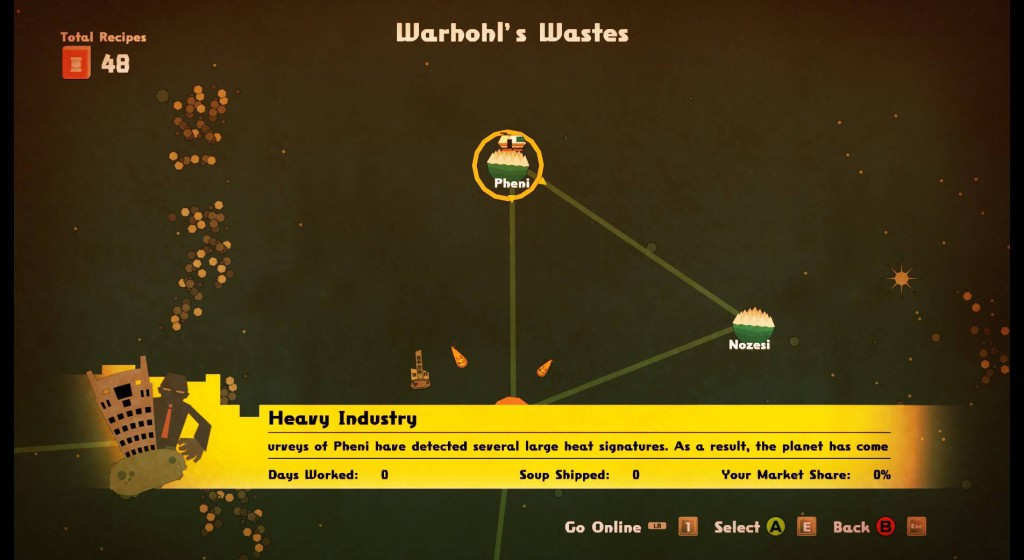
Nom Nom Galaxy can most easily be explained by dividing it into two parts. The first of these parts is the exploration element. In order to make soup, you've got to find ingredients. These ingredients can be found on and under the planet's surface. Thus, you must go foraging in search of them if you ever hope to succeed.
Your primary tools for exploration are:
- A jump/mantle combo, which lets you climb upwards and navigate moderately hilly terrain
- Ladders, which can be built on any solid surface and allow you to climb up and around more treacherous obstacles
- A whirling arm-mounted buzzsaw, which can dig through soft dirt
- An oxygen tank that gives you a limited exploration radius, unless you can find pockets of fresh air while exploring
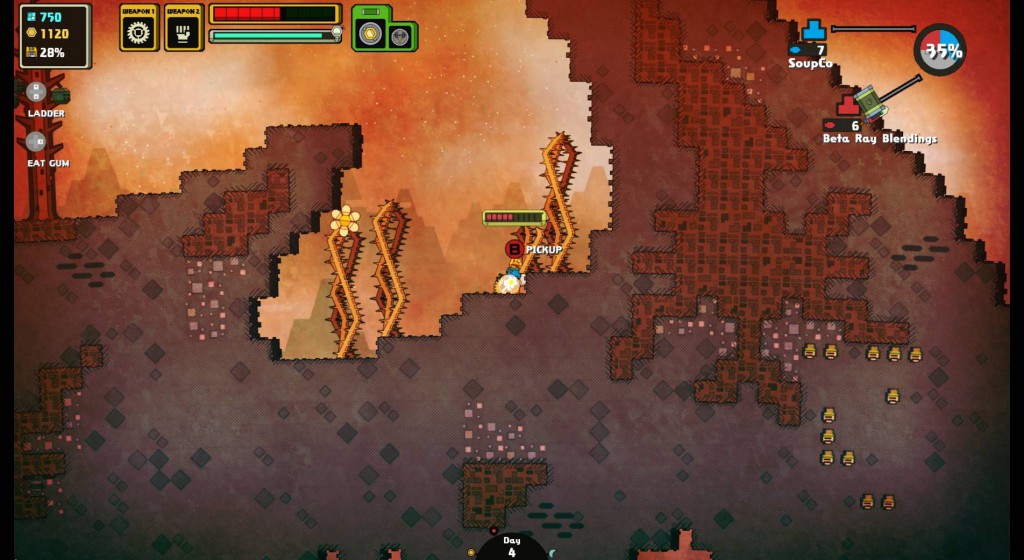
The exploration half of Nom Nom Galaxy looks (and initially feels) a lot like Terraria. However, the two games are worlds apart. In Terraria, you can precisely break blocks, have a large inventory in which to carry blocks and other resources, and can place items from your inventory into the world. These are pretty fundamental concepts of the entire block mining genre.
You've got no such control in Nom Nom Galaxy. The buzzsaw is by no means a precision tool, and once blocks are destroyed they're gone forever. You can lift a single block with some effort and place it elsewhere, but you'll never build anything significant this way. Player inventory is pretty much nonexistent; you can only carry a couple of ingredients at a time. Taking damage from any source - getting hit from an enemy, falling from too high a height, etc - drops everything you're carrying on the ground. While carrying ingredients, you can't fight back or use the buzzsaw at all.
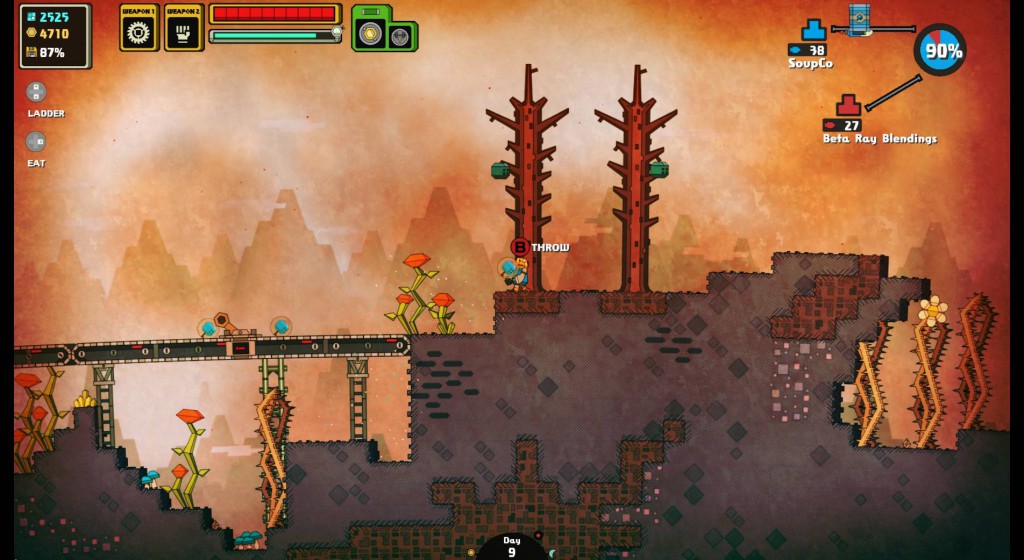
Pro Tip If you're exploring for new ingredients, give some thought to your return trip. Digging straight down technically works, although you'll be stuck with some painful ladder climbing and the risk of heavy fall damage. Digging a stair step pattern makes the process much easier.
The addition of the oxygen tank works with the limited inventory to really curb any excitement about exploration. You can't plumb the depths of the world without significant risk and little to no reward. Even if you manage to survive and find some epic loot, you've got to very carefully carry everything back to your base or risk losing it (along with a sizable chunk of your other resources) should you bite it.
On top of this, the controls don't feel that precise. I found myself fighting my controller to make my character move the way I wanted him to. My playtime was punctuated with a lot of missed jumps, falls into deep pits, and creaking analog sticks.
I've been pretty hard on the exploration side of the game, and I think I wouldn't be so hard on it if it didn't show such potential. Comparing it to Terraria may not be exactly fair, but I feel that's what people are going to think when they see screenshots or play it for the first time. If you go in expecting Terraria, you're going to be disappointed.
Simply Soup
The other half of Nom Nom Galaxy is a base building business sim with a "soup" theme. While digging in the dirt, you can collect "matter" which can be used to build new structures. Every factory starts with the office, and then branches out to construct soup machines and soup rockets.
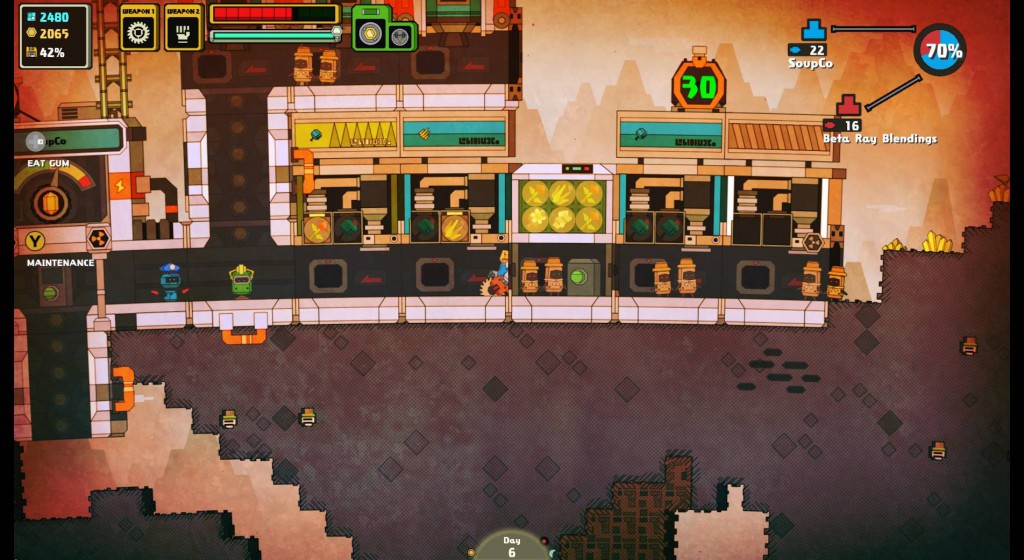
Pro Tip Some levels build the office for you, and once built it can't be moved or destroyed. If you're not sure if you're building from scratch or not, check the build menu. If the office isn't available for building, you'll have to find the factory before you can get started.
Soup machines take a set of two ingredients and combine them to form a can of soup. Different combinations of ingredients produce different soups, and each soup has its own value. Once a soup machine has been set to a particular combination, it can't be reset and will only accept those two ingredients. A handy "ingredient locator" will help you find the required ingredients, should you need it.
Pro Tip Most plant-type ingredients can be cultivated, so it is possible to create a sort of self sustaining ingredient farm near your base.
Once a can of soup is ready, you can load it into a soup rocket and send it to your hungry consumers. Soup rockets need a clear line of sight to the top of the map, and there's a decent delay while they make their deliveries.
Building factories, cultivating ingredients, and exporting soup is a lot of fun. Nom Nom Galaxy doesn't quite have the depth of a dedicated factory builder or business management sim, but that sometimes works in its favor, making it more accessible and alleviating the need to constantly consult wikis or guides.
The cash you earn from selling soup can be spent on robots and gear. Robots can automate some of the more menial tasks in the factory. For instance, they can carry ingredients to soup machines, or throw soup cans to the rockets for you. They can also cultivate and harvest ingredients. They're kind of dumb and slow, however, which limits their usefulness.
Winning a level in Nom Nom Galaxy requires that you get 100% market share and hold it until the end of the current day. Typically, shipping a can of soup earns you 5% market share, although sometimes events occur that modify this percentage. If a particular ingredient is at a disadvantage, it can actually decrease your market share to ship a soup that contains it. These events aren't always clearly marked, and if your factory is pretty well automated, you may inadvertently hurt yourself if you're not paying close attention.
The "100% at the end of the day" requirement can also cause frustration. Obviously, 100% is the maximum market share, at any point your rival can ship a can of soup and steal a bit of it. Therefore, you've got to make sure you not only dominate the market, but you also are the last one to ship on the day you hit 100%.
Souper Co-Op
The broad demands on your time, plus the limitations of the robot AI make this game all the better to co-op. Nom Nom Galaxy supports both online and couch co-op, and the game is much better when played together. Different players can focus on different areas, like exploration, cultivation, or automation. Resources are shared, so coordination is key.
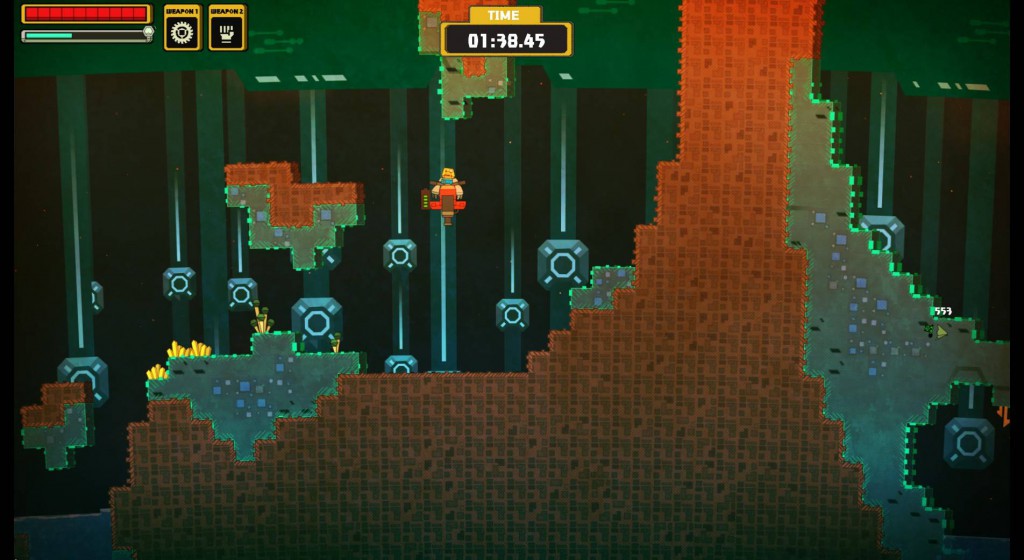
Nom Nom Galaxy also features a challenge mode, where certain aspects of the game are taken out of their typical context and turned into a competition against other players. Since I found a lot of the core game mechanics somewhat frustrating, I can't say that I got much mileage out of these alternative modes, but gamers looking to squeeze some additional playtime out of Nom Nom Galaxy may find them interesting.